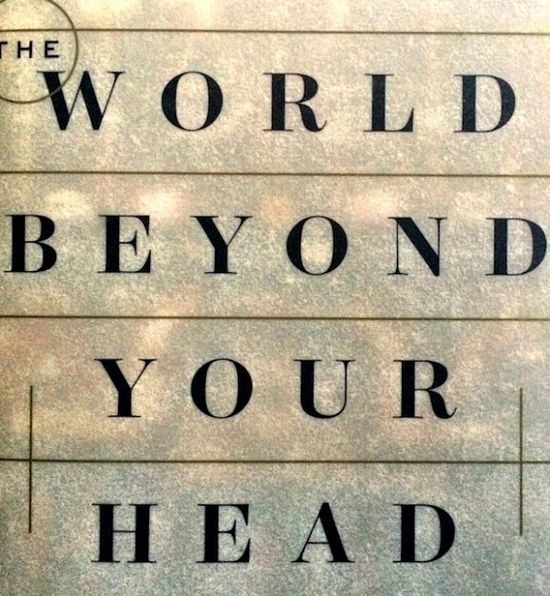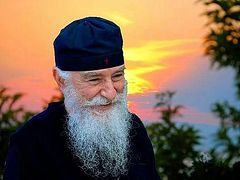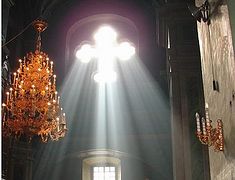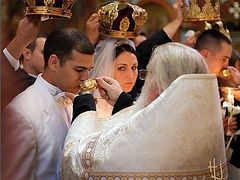Source: The American Conservative
January 25, 2016
A reader writes:
You write the following: “It has taken me almost a decade of being Orthodox to retrain my own way of seeing the world, to re-sacramentalize it.”
Could you perhaps just give me a paragraph or so on how you were able, in one decade, to ‘resacramentalize’ the world? I’d be in your debt.
He asked me this the other day, and I had to think about it before answering. I should start by saying that it has been a long, ongoing process, and it is a process that continues, day by day. The main highlights are the following, in no particular order; they all have worked together:
1. Art and the saints. Pope Benedict XVI said that these are the greatest apologists for the Christian faith, and I’ve come to believe from experience that he’s right. Over the years, I have come to experience the presence of God in works of art and architecture. Famously, for me, my turn to serious Christianity first happened in the Chartres cathedral, where the lines, the glass, and the stones shattered my callow skepticism. I did not leave that cathedral on that summer day in 1984 as a Christian, but I did leave convinced by the power of the revelation effected by the lines, the glass, and the stones, that there was Something More than what is merely apparent. They pointed to a greater reality, and opened my heart and soul with wonder.
Over the years, I have experienced this time and time again. Seeing and experiencing the holiness and compassion of other people, in various situations, from women like Mother Teresa, from afar, to women like my late sister Ruthie, up close. The film Babette’s Feast is a secular catechism regarding sacramentality. More recently, reading Dante’s Commedia overwhelmed my imagination, and unveiled the hidden reality of God and His transcendent order. And Evgeny Vodolazkin’s astonishing novel Laurus worked on my imagination with the same power, leading me to see all the world as a kind of sacrament, a theophany.
So, observing how the divine manifests itself in holy people, holy places, and holy works of art is training my imagination to see sacramentally.
2. Living the Orthodox Christian life. A core spiritual problem of mine, of longstanding, is that I live so much in my head, in the realm of ideas. Always have. As longtime readers know, standing in the ruins of my Catholic faith, I was able to see how my excessive intellectualism led me into a dark wood. It’s not that intellection is bad, not at all. Rather, it was that my faith was primarily an intellectual thing, and I did not see it at the time. I trusted far too much in reason as my stronghold, and neglected the conversion of the heart.
When I was making my way into the Catholic church in the early 1990s, a co-worker invited me to join me one Saturday afternoon helping out at the Missionaries of Charity soup kitchen. I peeled potatoes and washed pots and pans that afternoon. It was fine, but I concluded that for someone like me, so interested in ideas, I would be better off spending my time reading theology. I never went back.
That was a big mistake, as it turns out. Again, it’s not that reading theology is bad, not at all. But the faith was not fully incarnate within me, and within my heart. Over my years as a Catholic, I was faithful to the mass, went to confession frequently, and all that … but it was mostly a matter of living in my head, despite the fact that Catholicism is more sacramentally inclined than Protestantism. I was still able to keep it just me and Jesus in the Sacrament. Until I could not any longer. All that abstraction was not able to save me when my heart was too battered.
Orthodox Christianity was a great gift to me. It’s hard to convince people who have never worshiped as Eastern Christians (including Eastern Catholics) do, but the Eastern form of worship is much more intense and sacramental-feeling than most of what you’ll find in the West. The kissing of icons, the chants, the Psalms, the prostrations — all of it involves the body far more than Western Christian worship. And the overwhelming sense of timelessness and sanctity that comes to you through the Eastern liturgy — well, there’s nothing like it in the West. That began to pull me out of my head.
Plus, looking around me on Sunday morning and seeing portraits of holy men and women from many cultures and ages, on the wall and ceiling, reminded me that I am intimately connected to the communion of the church universal, across time. Every time I walk into my own parish now, I pray most intensely before a tiny bone fragment of St. Genevieve of Paris, the fifth century abbess who was a great ascetic, healer, and wonder-worker. I ask her nothing other than to pray for me, to ask God to make me courageous and steadfast, as she was, in walking the way of Jesus Christ. It is as if she were standing before me, because in heaven, she really is interceding for me, and for others. Having the relics and the icons present trains the imagination to experience what we Christians believe by faith is true: that the communion of holy men and women transcends time, and that the souls of those saints reside in heaven, and pray for us to our God.
3. The Jesus Prayer and fasting. Maybe it’s unusual to separate this from “Living the Orthodox Christian Life,” but I will, and here’s why. I have been Orthodox since 2006, but I didn’t fully engage with the Orthodox life beyond Sunday liturgy and the Lenten fast until we began our tiny mission in Louisiana in early 2013. I was very sick then with chronic mononucleosis, and our new priest, Father Matthew, assigned me an intense prayer rule involving the Jesus Prayer. In the Orthodox tradition, one clears one’s mind, and keeps it clear, while one slowly, meditatively, says quietly some version of, “Lord Jesus Christ, have mercy on me.” The number of prayers Father Matthew assigned to me meant that I was praying silently and contemplatively an hour each day.
It was very, very difficult it first. I used to pray the rosary from time to time as a Catholic, and enjoyed it. In the rosary, you fix your imagination on particular events from the lives of Jesus and Mary. Orthodox prayer, though, takes the opposite approach: you clear your mind entirely, focusing only on the words. My mind races constantly, so you can imagine how hard it was to get myself into the proper mental place for this kind of prayer. There’s no way to learn how to do it but by doing it.
Later, after I was free of the disease and the spiritual and emotional anxieties that triggered it, I asked Father Matthew why he had given me such a strict prayer rule. “I had to get you out of your head,” he said. Suddenly, the deep healing wisdom of that approach became clear to me.
Mind you, it didn’t happen through prayer alone. I was also living a regular Orthodox life, which included listening to Father’s Sunday sermons. The theme of every single one of them is, “Repent, for the Kingdom of God is at hand.” That is, he teaches that only when we humble ourselves in front of our own passions, repenting of them and denying them for the sake of life in Christ, can we know freedom and true life. It’s true. You don’t get Moralistic Therapeutic Deism in that church, nor do you get hellfire-and-brimstone. You get repentance, and you get theosis, the Orthodox term for being filled with the Holy Spirit and slowly transformed.
Fasting played, and does play, a big role in this. No meat and no dairy on most Wednesdays and Fridays, and for long stretches throughout the year. This is hard stuff, but for most of Christianity’s existence, this is what Christians have done. We in the West have lost this sensibility. The point is not doing without meat and dairy for the sake of abstaining from those things. The point is to discipline the body’s passions for the sake of the Spirit. It is about rightly ordering our bodies and our desires, reminding ourselves through our practices of the words of Jesus: “Man does not live by bread alone… .” It’s one thing to read that in the Bible, but it’s another to feel an intense desire for a hamburger, and to tell yourself no, that serving God requires abstaining now.
Once you get used to telling yourself no in small things, it becomes easier to do so in larger things. More to the point of the reader’s question, you come to understand the connection between matter and spirit viscerally, because you learn to feel it in your gut.
We live in a world in which we have lost the reflexive sense of God’s presence in all things — what the Evangelical theologian Hans Boersma calls “sacramental ontology”. All Christians used to believe in this. We began to lose this vision in the 13th and 14th centuries, and it is all but gone now. We won’t start to recover spiritually and morally until we begin to recover this ancient Christian vision to some significant degree — though how we Christians in postmodernity do so out of our own traditions is a very difficult question. It’s still there, fully, in Orthodoxy, and though the struggle is never-ending, I am blessed to have recourse to it — but it’s sadly clear that not all those baptized into Orthodox Christianity accept the great gifts on offer in their church. I did not until fairly recently, but it has made a tremendous difference in my life. And this is my personal answer to the reader’s question.
One more thing: reading philosophy and theology still plays an integral role in re-sacramentalizing my vision. The (totally secular) book by philosopher Matthew B. Crawford, The World Beyond Your Head has been helpful recently, as has Boersma’s Heavenly Participation, though written for the Evangelical reader. Even if you are Catholic or Orthodox, if you are an American, you grew up in a nominalist, non-sacramental culture, and this has affected your Christian faith more than you probably realize. It’s true for me.





Orthodox Christianity evolved in a very different environment in the southwest Asian deserts (Australia and Southern Africa are similar). Here rainfall is erratic and low, and soils unaffected by the great Quaternary glaciations, orogenies and loess formations. As high pH reduces their availability, these soils are deficient in phosphorus and several key elements for animal biomass - zinc, copper, cobalt and selenium. As many of the oceans (around Australia and the Mediterranean) have small tidal ranges, and are warm and consequently nutrient-poor, animal food is very scarce.
This protein scarcity produces severe taboos upon its consumption, observed not only in Orthodox fasting but also in Jewish kosher laws and the ahimsa of the Dharmic religions. Primitive peoples of Australia and Southern Africa, with soils vastly less fertile still, also had major taboos upon animal food.